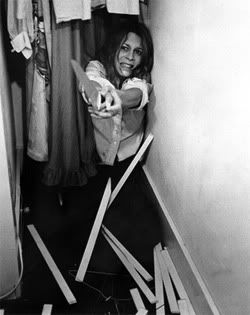Happy Valentine's Day! And welcome to my Love at First Sight Blogfest entry! So, I know the rules say you're supposed to put when your characters first meet, but I already posted that scene a while back. And really, in my books there is no love at first sight--only lust at first sight--love comes much later. :) So I'm using a scene where my two characters realize that no matter how hard they're trying to ignore it, the attraction between them is something they are going to have to deal with.
Setup: Quinn is a school social worker assigned to help with the school's Battle of the Bands competition. Sean is the lead guitarist of a rock band, volunteering (well sort of, but that's another story) his musical expertise to help with the kids. Alright, here it is in it's rough draft glory...
The students gathered their thingsfilling the room with a cacophony of conversations and chairs scraping acrossthe floor. As the kids exited, Quinnputtered around, picking up stray papers and pencils and straighteningfurniture. She was always amazed at howquickly teenagers could turn a place upside down. She wandered to the back of the classroom to grab an acoustic guitar one of the students had forgotten to put back in thecase. She picked it up and threw thestrap over her arm, letting the instrument swing slightly while she headed backtoward the stage. A loud bang erupted asshe accidentally knocked the guitar against a desk.
“Theydon’t like it when you treat them rough,” Sean said, causing her to jump.
Quinnwhirled around. “What?”
Heshut the door behind him and nodded at the guitar.
Shecringed. “Sorry, yeah, I probablyshouldn’t be entrusted with the equipment. My musical skills are relegated to loading up songs on my ipod.”
Henarrowed his eyes as if considering her, then placed the two cans of cola he'd been holding on a desk. “Here, if you’regoing to be running a battle of bands, you need to at least know how to handle aguitar.”
Quinn chewed her lip as Sean strode across the room, his gait smooth andconfident—all man. Her gaze flicked tothe closed door of the room. Crap. Being alone with the sexy musician was not part of the plan. He stopped in front of her andwrapped his hand around the neck of the instrument, easing it away from her. He pointed to the stage. “Sit.”
Shehoisted herself onto the edge of the platform, her feet dangling.
“Areyou right or left handed?” he asked, twisting a few knobs on the top end of theguitar.
“Right.”
“Okay,good.” He put a foot on the edge of thestage and in one easy stride, lifted himself onto it, then stepped behind her. Before she could look over her shoulder to seewhat he was doing, he lowered the guitar in front of her, his muscular armsframing her torso. “Now, you want thebody of the guitar against your stomach or chest depending on what’scomfortable for you.”
Theguitar rested on her leg, the edge of the instrument's body barely skimming her breasts, hyper aware of every sensation now that Sean’s arms were so close. She took a steadying breath. “What do I do with my hands?”
Hisfingers circled her right wrist and brought her hand to the long part of the guitar. “Keep your thumb on the back of the neck andthen curl your fingers around the front. This is your fretting hand.”
Sheclosed her eyes, relishing the warmth of his touch on her fingers. “And the other one?”
Therewas a rasping sound as he apparently dug in the pocket of his jeans. He dropped a piece of plastic in her lefthand. “This is your picking hand, so youuse this on the strings. Hold itbetween your thumb and forefinger.”
Shelaughed as she positioned the little triangle. “You always carry a pick in your pocket?”
“Always,”he said and released her hand. “Now,you’re all ready to bust out a little Stairway to Heaven.”
Shedragged the pick across the strings, and an awful sound escaped. She cringed and peeked up at him. “Oh yeah, I’m ready for the big time.”
Hechuckled and squatted down. “Here.”
Her breath caught as his thighs slid along the outside of hers and his body curled around her back. His scent, a heady mixture of sandalwood and sunshine, cocooned her. She gripped the guitar tighter and tried to focus on staying relaxed, on being cool--professional. But alarm bells screamed in her head, alerting everynerve ending that there was a delicious man pressed against her. Traitorous goosebumps marched across her skin. Great. Maybe she should just put up a billboard announcing how much this guy affected her.
His breath brushed her ear. “Press your fingers down on this spot,” he said, guiding her right handon the neck. “And then I’ll help youwith your picking hand.”
Words stuck in her throat. Shenodded.
His hand covered her left one, andhe led it down the strings, creating a perfect sounding note. “There you go, your first chord. You’re on your way.”
Sheswallowed hard and wet her lips. “Playsomething, Sean. Let me see a professional do it.”
Shefigured he would take the guitar from her and strap it onto himself, giving her some much needed breathing room, but hedidn’t move. His hands replaced hers, andwith her sandwiched between his muscular chest and the instrument, he startedplaying. His fingers moved effortlesslyalong the neck, the other hand strumming. The opening to The Eagles “Hotel California” drifted through the empty dramaroom. She closed her eyes, absorbing thesound, his smell, and the caress of his breath on her neck. She had to bite back a sigh when his voice, low and coarse, started singing the lyrics into her ear. Her insides melted into fiery lava.
Without thinking,she relaxed her spine and leaned into him, releasing a tiny gasp when...
Well, I'll stop there. We're supposed to keep this PG people. :) Let me know what you think.
Have a wonderful Valentine's Day!
**Today's Theme Song**
"Hotel California" - The Eagles
(player in sidebar--go ahead, take a listen)

by Blake Snyder.







